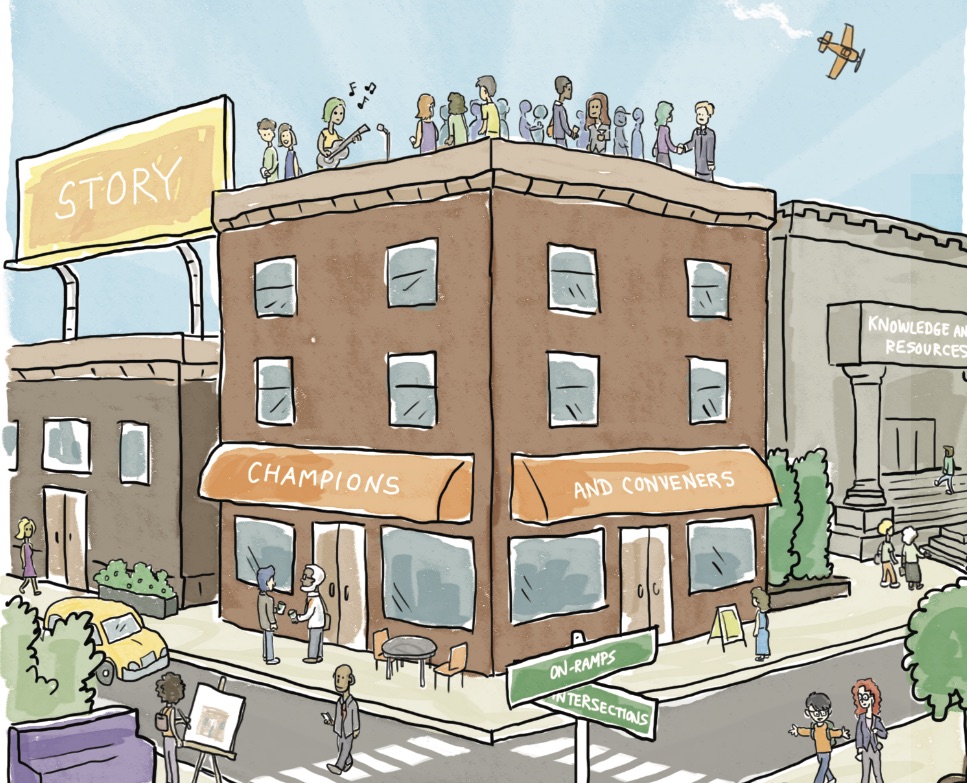Whether it be in art, technology or science, fledgling fields of study often face challenges of legitimacy when they enter the mainstream.
Such is the case for the domain of ecosystem building, which struggles to find validity for and unity among those working to create vibrant communities in which entrepreneurs thrive, said Victor Hwang, vice president of entrepreneurship at the Ewing Marion Kauffman Foundation.
“The emerging field of ecosystem building does not yet have all the necessary professional resources in place,” Hwang said. “We still lack consensus around some core aspects of the work, including shared outcomes, common metrics, proven methods, and key definitions. As a result, a growing number of ecosystem builders struggle with small budgets, overwhelming workloads, and skepticism in their communities. We see troubling levels of burnout among many practitioners.”
Those struggles are in part why the Ewing Marion Kauffman Foundation is hosting its second-annual ESHIP Summit in Kansas City. Starting July 11, the ESHIP Summit is expected to convene more than 500 entrepreneurial ecosystem builders from across the country who will connect with and learn from one another during a private, three-day series of events and activities at the Kansas City Convention Center.
Conversations and activities range from interactive “campfire” conversations to discussions on building inclusive economies to establishing goals for ecosystem builders across the U.S. The event will prioritize the involvement of underrepresented populations and support the sharing of tools, metrics and models to validate ecosystem as a viable approach to economic development, the Kauffman Foundation said.
Attendees also will inform and dissect the foundation’s Playbook 2.0. The revised 104-page book — which is still in draft form — aims to provide a framework for ecosystem builders around the world.
“Going forward, we must properly equip ecosystem builders as professionals to tackle the challenges they face,” Hwang said. “The Kauffman Foundation can help, but we can’t do it without you. Together, we can assist practitioners and providers to build professional networks; share knowledge, practices, and stories; build new resources; and generate support for ecosystem building nationwide. This is ultimately about lifting you, the individuals doing the work on the ground and in the trenches.”
The ESHIP Summit returns to Kansas City after its inaugural event in June 2017. That summit was reportedly the largest gathering of ecosystem builders, convening conversations around improved inclusiveness of minority entrepreneurs and the need to cultivate a new model of economic development.
The discussions validated the Kauffman Foundation’s support of research and progress for that new, collaborative approach, Hwang said.
“These conversations reaffirmed our commitment to advancing entrepreneurial ecosystems as a model for economic development,” he said. “That model focuses on how the whole of a community is far greater than the sum of its parts. It means starting with what a community has and connecting the pieces. More than ever, we believe ecosystem building can transform communities of varying sizes, demographic and socioeconomic contexts, and geographies, and create more sustainable economies everywhere.”
Developing metrics and frameworks around ecosystem building is vital to communities’ future prosperity, Hwang said.
“Together, we can professionalize the practice of building entrepreneurial ecosystems,” he said. “We can drive adoption of a new entrepreneur-centric approach to economic development. The effort will take time, and it will require extraordinary collaboration by all of us. And remember, we are still at the beginning. But succeed we must. In the balance are the silent hopes of countless entrepreneurs, yearning to turn their dreams into economic realities and contribute to our shared prosperity.”
Stay tuned to Startland News for coverage and takeaways from the 2018 ESHIP Summit. Below is the Kauffman Foundation’s Declaration of Interdependence, which was derived from the 2017 ESHIP Summit.
The Declaration of Interdependence
We believe that there is a need for a new model for inclusive economic development, one that takes into account the whole system.
We know that to build these complex yet accessible systems, we must act in interdependent, inclusive, and equitable ways.
We understand that these living systems evolve in complex ways, and that without collectively-held intent, they cannot grow to their full natural potential.
We recognize that to surface this collectively-held intent, there is a new emerging role, profession, and community of practice that is required – that of the ecosystem builder.
We are mindful that as an emerging field, these ideas will be new to many people. We must practice grace, humility, and empathy as we work with each other to evolve these new ways of thinking.
We embrace that we are a large group of leaders and catalysts with diverse backgrounds, skills, experiences, expertise, motivations, and visions for the future.
We are encouraged that in a world of increasing complexity, it is the inclusion of these diverse perspectives that will allow us to innovate, design, and deliver sustainable solutions for our ever-evolving communities.
We, as a community of practice, are here to support the development of 1) each other; 2) each others’ communities; and 3) the principles, culture, tools, and metrics necessary to infuse entrepreneurship more deeply into our economics.
We acknowledge that change is difficult and requires sacrifice, and that growing healthy ecosystems often requires balancing the maximization of short-term outputs against a need to work with a long-term view. These challenges are essential – and important – to our success.
We pledge to pursue this vision together – to ensure that the makers, the doers, and the dreamers from all demographics of society have the opportunity to change their circumstances and to have a positive influence on themselves and the world.




































